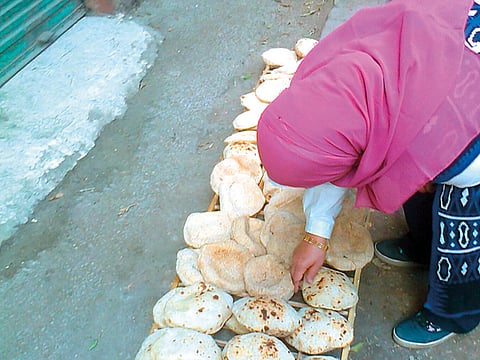Seizing subsidized goods is a cardinal sin, says Egypt’s top Islamic agency
A massive plan is afoot in the Arab world’s most populous country to overhaul the subsidy system

Cairo: Egypt’s top Islamic body, Dar Al Ifta, has prohibited illegal acquisition of subsidised goods as the country is struggling to overhaul the bloated socialist-era subsidy system.
The agency, in charge of issuing binding edicts in the mostly Muslim country, said Tuesday that illicit seizure of subsidised commodities or barring the needy from having access to them is proscribed by the Islamic Sharia law and was a “cardinal sin”.
Such practices “constitute harm to and aggression on those who deserve them and the public money,” Dar Al Ifta added in an online statement.
The admonition comes as Egyptian authorities have recently stepped up raids on outlets illegally trading in subsidised food to rake in profits from the difference in prices between subsidised goods and those on the free market.
“Buying subsidised goods from those who have plundered them is prohibited if the buyer learns about this [plundering] as this represents complicity in sinfulness and aggression,” Dar Al Ifta said. “Gains made through these deals are illicit and wicked.”
The prestigious institution urged wrongdoers to repent and refund the value of the goods.
In recent months, the Egyptian government has partially cut state subsidies on fuel and electricity as part of tough economic reforms.
However, President Abdul Fattah Al Sissi last month doubled the value of subsidised food obtained by ration card holders with the aim of easing the effect of recent cuts in energy subsidy on people living on limited income.
Around 71 million of Egypt’s 93 million people are currently having access to the subsidised food system.
A few months ago, the government started a nationwide plan to revise beneficiaries of the system in a move reportedly aimed at excluding 10 per cent of the current ration card holders. They have until July 15 to update their data related to jobs, residence areas and electricity bills, criteria seen as helping determine eligibility to food subsidies.
The government has repeatedly urged those who do not deserve obtaining a monthly quota of subsidised bread, cooking oil and other staples to voluntarily give up their ration cards in order to avoid unspecified fines.
Egypt’s subsidised system dates back to the Second World War years. The government has said it has allocated a total of 86 billion Egyptian pounds (Dh17.8 billion) in subsidy of bread and other food items in the country’s public budget for the new fiscal year that started on July 1.
Egypt’s efforts to downsize state subsidies come as the country is experiencing a tough economic crisis.
Last November, Egypt floated its local currency and slashed state subsidy on fuel, moves that gave the country access to a 12-billion-dollar loan over three years from the International Monetary Fund.
In recent weeks, fresh increases in fuel and electricity prices were announced under a government scheme to phase out energy subsidies.
The Egyptian economy has been in the doldrums due to the upheaval that followed the 2011 uprising, which scared away foreign tourists and investors.



